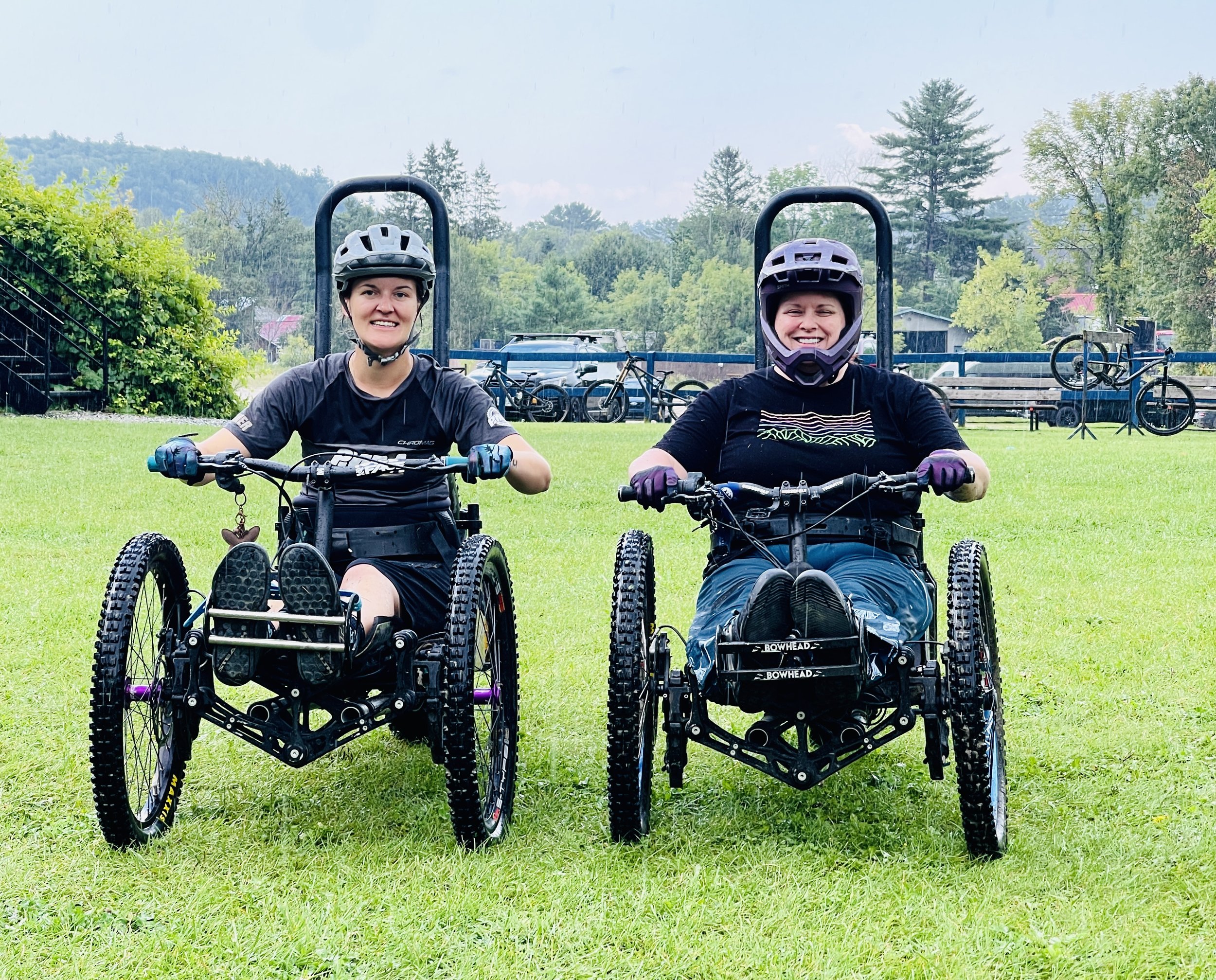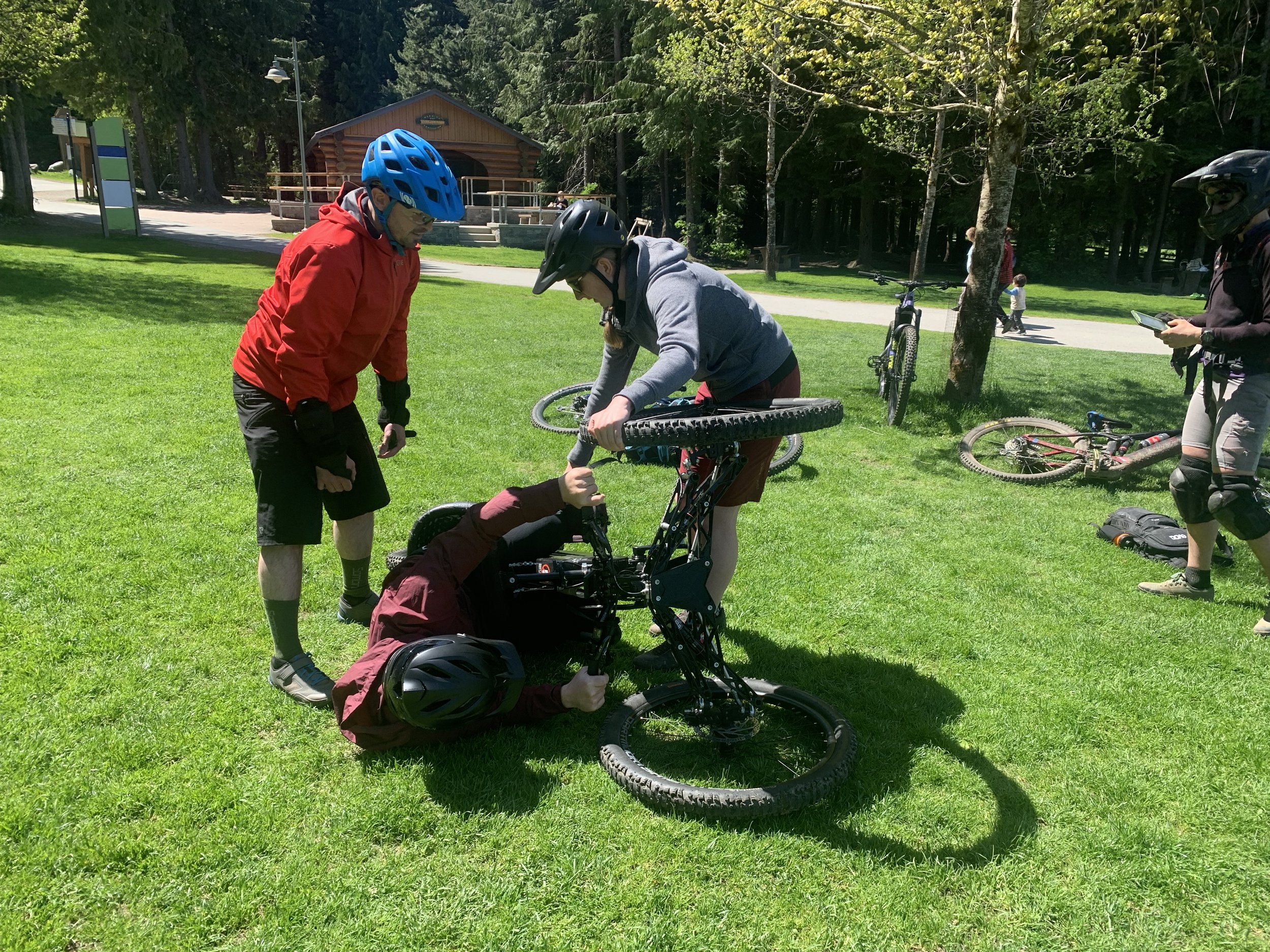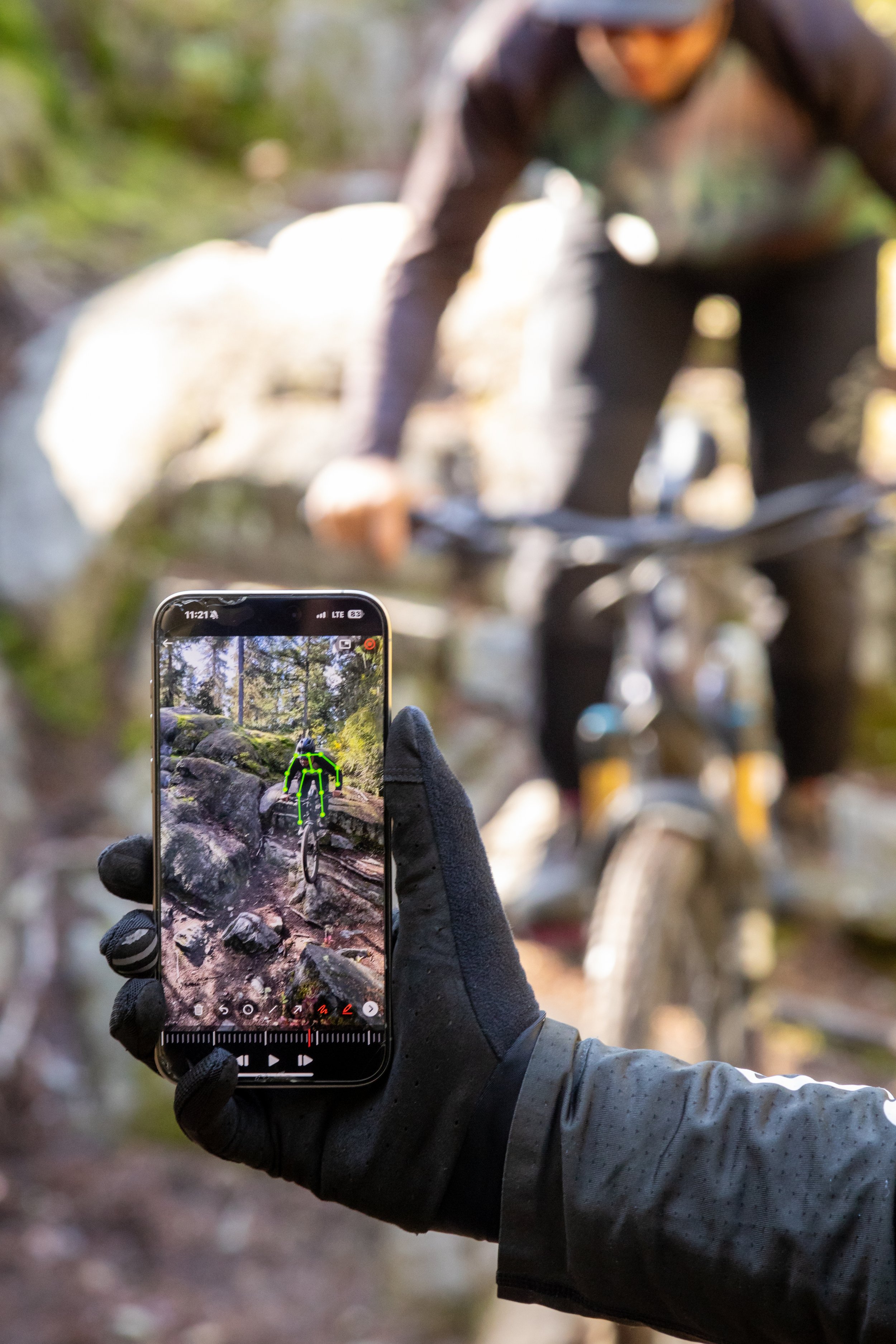ADAPTIVE INTERMEDIATE COACH
This training course is your gateway to the world of adaptive mountain bike coaching! Open to three-wheeled adaptive riders and two-wheeled riders, it’s perfect for those interested in coaching beginner to intermediate three wheeled and two wheeled riders.
3-DAY COURSE
TEACH & GUIDE BEGINNER TO INTERMEDIATE ADAPTIVE RIDERS
LEARN TO INSPIRE, CONNECT WITH & ELEVATE YOUR STUDENTS
ESSENTIAL TRAINING FOR THE LEVEL 1 ADAPTIVE CERTIFICATION
COURSE OVERVIEW
-
This course has been developed in partnership with adaptive riders and adaptive sports organizations and is open to both Adaptive and two-wheeled riders, and acts a great stepping stone into the world of mountain bike coaching.
Adaptive and 2-wheel riders who aim to coach and support beginner to low-intermediate adaptive and/or 2-wheel riders.
Work as a volunteer guide to lead group rides for beginner to novice adaptive and two-wheeled riders.
Work as an assistant coach or as a ‘tail guide’ with another Level 1 certified coach, or higher.
Prepare for either of the Advanced Coach Courses
-
The Intermediate Adaptive Coach Course equips participants to teach and connect with riders on beginner to intermediate terrain. The curriculum covers essential coaching skills, including social interaction, risk management, technical proficiency, and effective teaching techniques.
Coaches will gain hands-on experience with practice teaching on trails and in open areas, receiving feedback on both their coaching and riding skills throughout the course.
This training course introduces coaching adaptive mountain biking, focusing on guiding and supporting riders with varying physical and cognitive needs.
The course includes detailed discussions on coaching considerations and a hands-on workshop covering adaptive e-bikes and equipment.
Includes GSMBC Reference Guide, Apprentice Course Booklet and Online Workshop.
-
The course consists of 3 days of in-person training, plus 2–3 hours of pre-course reading and online workshops
Totalling at least 27 hours including assessments.
Assessments include:
Online Workshop
Skills Coaching Assessment
Riding Skills Assessment
-
A Focus on Coaching: While the course offers some riding improvement, the primary focus is on teaching skills. Riders should have confident riding abilities to fully engage in learning coaching techniques.
Riding Skills: Confident on intermediate, technical terrain (e.g., green, and blue), capable of guiding and teaching other riders on technical and flow blue trails, anywhere in the world.
Preparation: Complete pre-course reading and worksheet.
Experience: At least 36 months of mountain biking experience.
First Aid: 40-hour Wilderness First Aid certification recommended but not required.
E-assist and throttle AMTB’s or Class-1 EMTB’s (limited speed, no throttle) are welcome.
LEARN TO TEACH BEGINNER TO INTERMEDIATE THREE WHEELED & TWO WHEELED ADAPTIVE RIDERS
LEARN TO TEACH BEGINNER TO INTERMEDIATE THREE WHEELED & TWO WHEELED ADAPTIVE RIDERS
Learn how to connect with students and provide a human-centric approach to coaching and learning.
Learn the coaching skills required to plan and deliver safe, effective lessons for two and three wheeled riders.
Learn how to assist other adaptive riders as required, based on their physical and cognitive needs.
Improve your own riding skills and confidence with feedback from the GSMBC Mentor.
Personal video analysis on every coursE WITH THE Sportsense coaching app!
✺ Frequently asked questions ✺
-
Food, water, tools, spare tube and clothing to suit the conditions that day… we ride rain or shine!
First aid kit not essential, but recommended.
The best bikes for this course are e-assist Adaptive MTBs (with or without throttles) or Class 1 E-MTBs (no throttles). Regular two-wheeled enduro/trail mountain bikes are welcome but might not be the best fit. Riders on standard bikes should be in good physical shape to keep up with the extra speed and power of e-assist Adaptive bikes or E-MTBs.
Good quality, well fitted mountain bike helmet.
Gloves and knee pads are recommend.
Any other personal protective and mechanical gear that you need for your AMTB or MTB.
-
Every GSMBC course aims to finish between 4 - 4.30pm, depending on the conditions that day and the specific course location.
-
The Intermediate Coach Course is for riders and coaches of all ages but the minimum participant age is 15 years old. We want to encourage all shredders to join the amazing career of mountain bike coaching by levelling up and becoming a professional mountain bike coach.
-
Yes! You will receive the Adaptive Apprentice Coach Certificate for simply attending this course, which enables you to work as a tail guide or assistant coach, to help gain more experience before you return for your retest.
-
Yes! Your GSMBC Mentor will work with you to develop your bike set up and technical riding skills.
-
During the Adaptive Intermediate Coaching Course, coaches will have several opportunities to practice teaching, lead groups, and demonstrate their riding skills.
Upon meeting the minimum competency level in both coaching and riding assessments, coaches will receive the GSMBC Level 1 Coaching Certification.
-
Our goal is to create a fun, friendly, non-intimidating atmosphere, so coaches can learn and progress at ease. The coaching and riding skill assessments continue throughout the 3 day course as an overall impression, avoiding a ‘final exam’ senario. This human centric approach reduces stress and lets coaches explore, learn, and grow through experience.
-
Coaches are assessed using the PECAM Marking System that we have adapted from the Coaches of Canada Skill Development Model.
Processing | Emerging | Consolidating | Autonomous | Mastery
Level 1 Coaches are required to be at the ‘Consolidating’ stage of skill development in both the coaching and riding skill assessments.
-
Coaches must be able to show fairly consistent technique when riding at trail speed on green and blue single track terrain. Some technical examples include:
Dynamic Positioning: able to control their own body mass to ensure a strong, yet mobile position on the bike when climbing and descending off road.
Speed Control: able to use the brakes on loose surfaces to slow down or maintain speed, without skidding.
Flow: able to scan varied terrain and choose the appropriate lines to ride safely, efficiently and smoothly.
Corners: able to connect or disconnect from the bike to control its direction at varied speeds, on a variety of corners.
Bumps: Able to use their body as suspension to control bumps and rollers in technical terrain.
Wheel Lifts: can perform foundational adaptive (roll up, roll down, off-camber) or 2-wheel maneuvers (front/rear wheel lift, pedaling wheel lift).
-
Coaches must first connect with students so they can effectively adapt, plan and deliver fun, relevant and safe lessons. Core Level 1 Coaching Standards include:
Connecting with students to promote socially safe, fun learning environments.
Prioritizing safety and risk management at all times.
Leading groups with confidence in inherently risky mountain bike terrain,
Using the GSMBC Coaching Models to execute safe, effective lessons that inspire and progress the students.
More standards are outlined in detail in the GSMBC Course materials, following registration.

REGISTER
COURSE INCLUDES GSMBC Coaching Manual, Course Guide & Online Workshop
Why not grab yourself some GSMBC Merch when you’re heading through checkout?!
-
-
Check back soon for upcoming course dates!
-
Check back soon for upcoming course dates!
COURSE REQUESTS?
If you or your team, friends or community are looking to book a course at a new location or during a time that is currently offered, please reach out to us via our course request form, available here:





